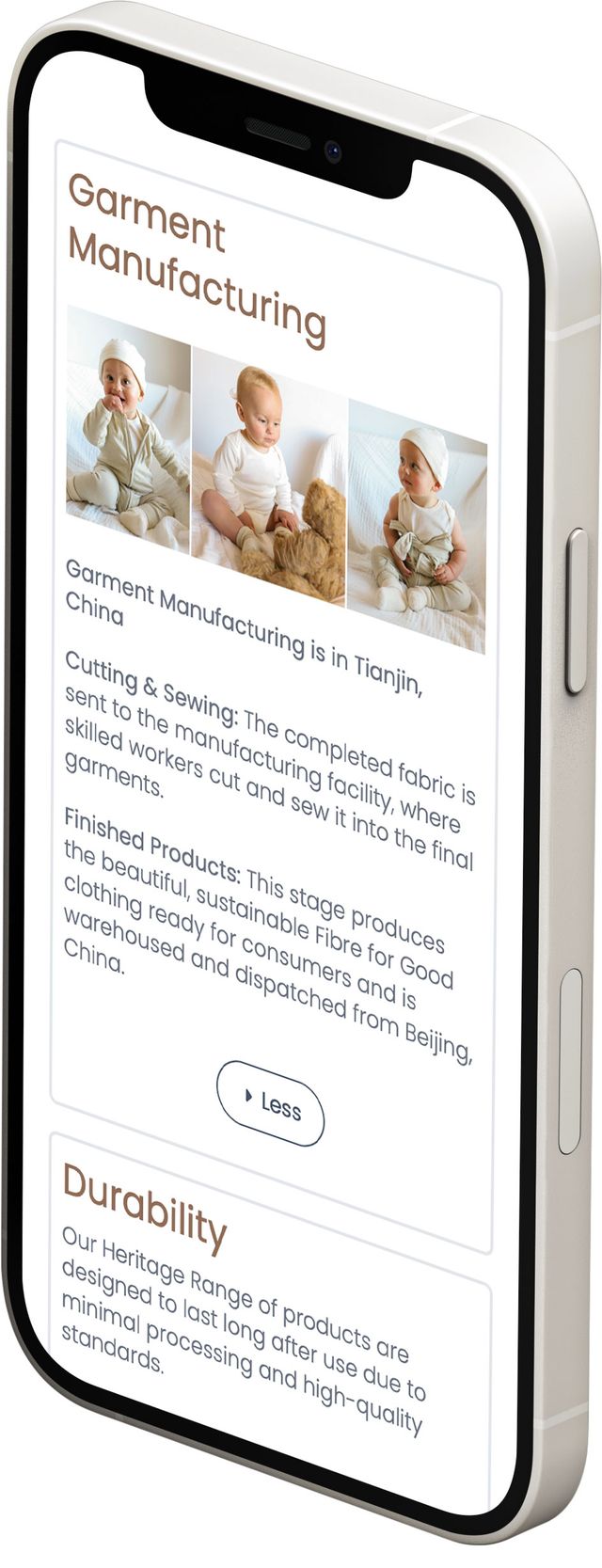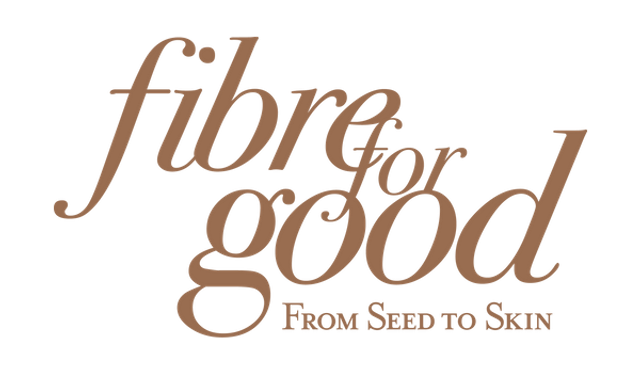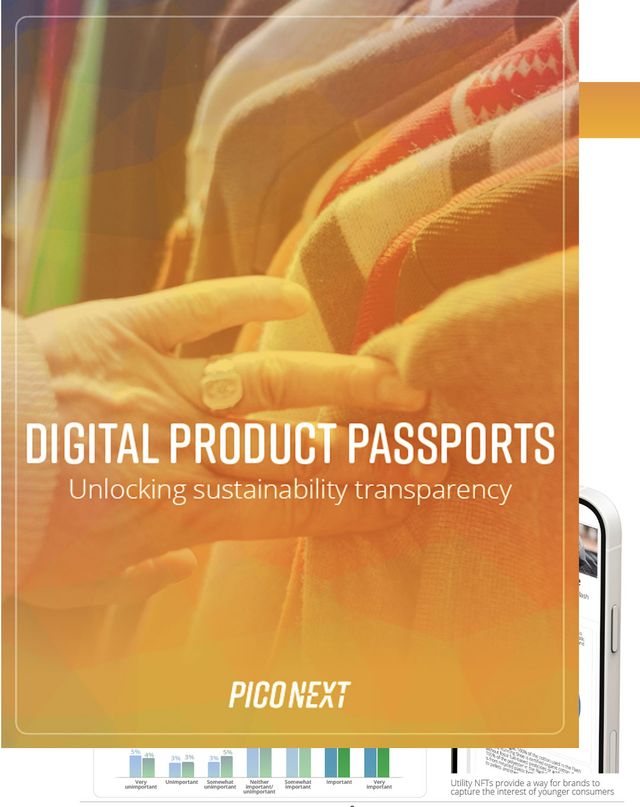For Fibre for Good, a Sydney-based children’s lifestyle apparel brand, environmental responsibility is at the core of its mission. The company relies on organic natural colour cotton as a key element to its line of baby wear products, which allows it to eliminate artificial dyes and toxic chemicals in the production of its clothing. Its apparel basics are designed to be timeless, fit regardless of gender, and resonate with mothers across apparel categories.
To reach customers, the brand distributes its clothing using a Shopify-based store, which allows it to easily deliver a superior customer experience using a streamlined e-commerce workflow.
Focusing on regenerative farming and organic cotton
Throughout its history, Fibre for Good has focused deeply on sustainability. Using organic natural colour cotton in its products consumes three-quarters less water than conventional cotton. The company sources drought-resistant and pest-resistant heirloom cotton varieties that retain natural softness, hypoallergenic, and anti-static properties.

One unique aspect that differentiates Fibre For Good from other children’s apparel companies is its emphasis on regenerative farming in the production of its rompers, pants, and socks. Organic cotton is carefully picked to not damage the fibres, and hand-processed so the farmers can retain the seed. Because the company works closely with multi-generational farming families on sustainable agriculture, seeds from the harvest can be repurposed to be used again in next year’s planting, or used to make cooking oil as a byproduct.
These farmers rotate cotton with food crops and use livestock for natural pest control and fertilisation. In addition, Fibre for Good ensures fair compensation by paying farmers upfront to cover cultivation costs and guarantee their livelihood.
This attention to detail results in a more sustainable product. The colours in the cotton are all-natural: green derived from chlorophyll, brown from tannins in the soil, and white coming from a natural, unbleached cotton. In addition, clothing produced with organic, regenerative-farmed cotton can be composted at the end of its useful life – resulting in a true circular product.
Communicating clearly with customers using DPPs
Because of the care Fibre for Good takes in the production of its products, it wanted to communicate clearly to customers about the benefits of its organic natural colour cotton. It chose to do so with a Digital Product Passport (DPP) in order to provide next-level sustainability detail for customers, as well as comply with upcoming regulatory standards in the European Union and elsewhere. It also uses its DPP to educate consumers about organic and regenerative clothing, avoid greenwashing, and help customers make responsible choices.

With our organic natural colour cotton, we offer eco-friendly baby wear that parents can have their little ones snuggle up to — with no hesitation whatsoever.

“Typically in apparel production, companies use harmful dyes in their garments and generate large amounts of wastewater,” said Carl Ludwig, Founder and CEO of Fibre for Good. “With our organic natural colour cotton, we offer eco-friendly baby wear that parents can have their little ones snuggle up to — with no hesitation whatsoever.”
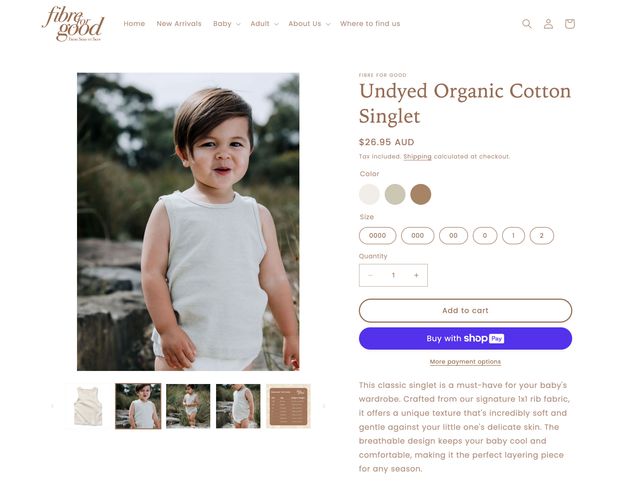
Using the PicoNext Product Passports app for Shopify to accelerate DPP production
Fibre for Good has long used Shopify as its e-commerce platform, and had already consolidated details about each of its products within its Shopify storefront. Creating Digital Product Passports for each item in its new Heritage line posed a challenge, however, due to the amount of data, and time necessary to gather and organize the data.

Using the PicoNext Product Passports app for Shopify helped us produce our Digital Product Passport more quickly, and at lower cost than we could otherwise have done.

That’s when Carl and team, with the help of sustainability consulting partner Circular Society, turned to the PicoNext Product Passports app for Shopify. Using the app, Fibre for Good was able to review the products within its Shopify store for which it could create a Digital Product Passport. Then, it selected a product directly within the Shopify admin panel, as well as additional information from an existing store page (like its sustainability-focused "About Us" page).
Reducing DPP production cost and time-to-market
The PicoNext AI Assistant used large language AI models to quickly analyze that information in the context of an apparel-oriented DPP template, looking for apparel attributes like raw material sourcing, environmental impacts, recyclability, and more. The PicoNext Product Passports app for Shopify then created a DPP draft, complete with the product's title, image, and summarized product data. Fibre for Good was then able to review, edit, and approve the data before finalizing and publishing its DPP.
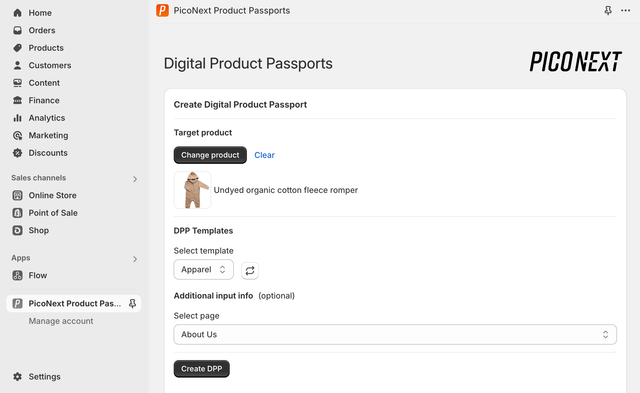
“Using the PicoNext Product Passports app for Shopify helped us produce our Digital Product Passport more quickly, and at lower cost than we could otherwise have done,” said Carl. “Instead of manually sifting through all of our sustainability data, we used AI to generate a first pass of our DPP directly from our Shopify store, which we then fine-tuned to achieve our final result.”
Integrating DPPs into the brand experience
Fibre for Good also wanted its Digital Product Passport to align with the brand experience it has carefully crafted for customers. It decided to use PicoNext Enterprise APIs to display DPP data in a custom-branded website replete with the natural green and brown hues found in its clothing. The customised DPP website provides a one-stop location for customers to review the sustainability disclosures for each Fibre For Good product, and provides a way for the brand to differentiate itself in terms of its unique, organic natural colour cotton.
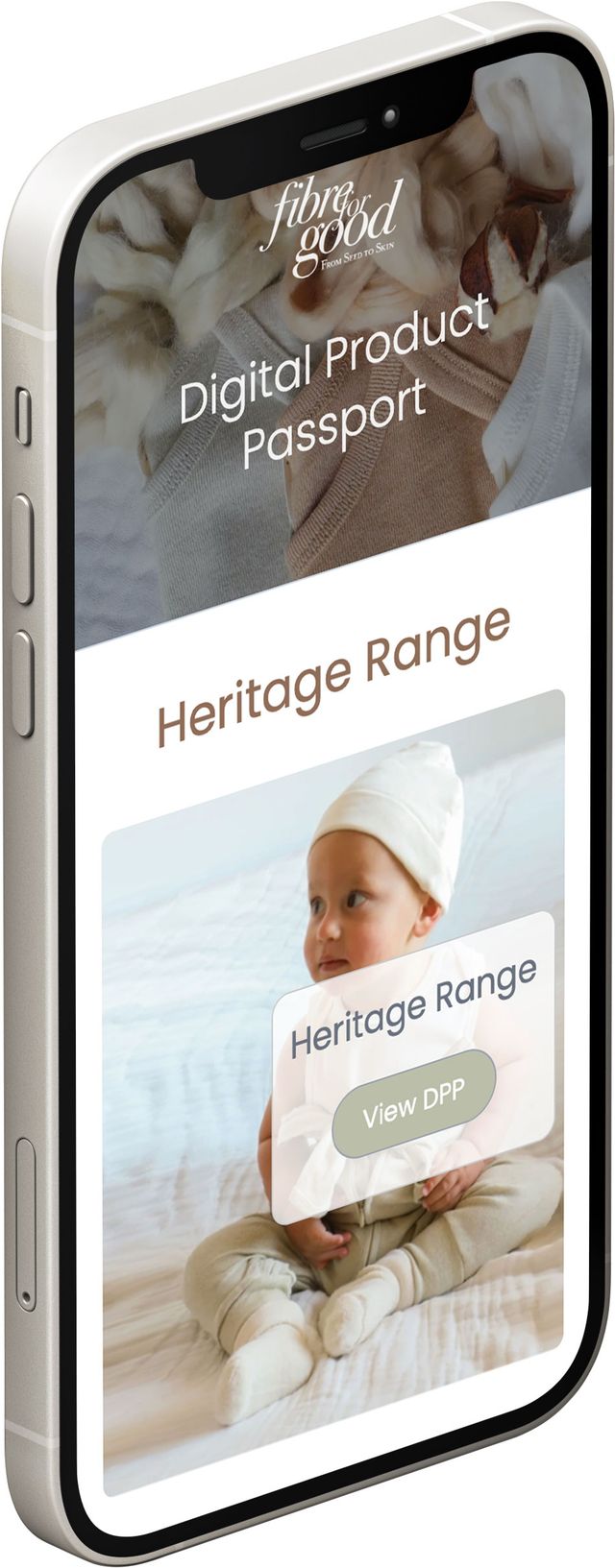
Leading the way with Digital Product Passports
For the company, Digital Product Passports are a way to show its commitment to transparency and connect more deeply with customers around shared sustainability values. In the future, Fibre For Good is looking to expand its DPPs into other parts of its product portfolio and add brand engagement features that enhance the customer experience.
“We want to lead the way in conscious consumerism, and help our customers make informed choices that leave a positive impact on the planet,” said Carl. “Our Digital Product Passport is key to achieving this, because it empowers our customers with knowledge and transparency about sustainable practices — now and for years to come.”

We want to lead the way in conscious consumerism, and help our customers make informed choices that leave a positive impact on the planet.
Our Digital Product Passport is key to achieving this, because it empowers our customers with knowledge and transparency about sustainable practices — now and for years to come.
